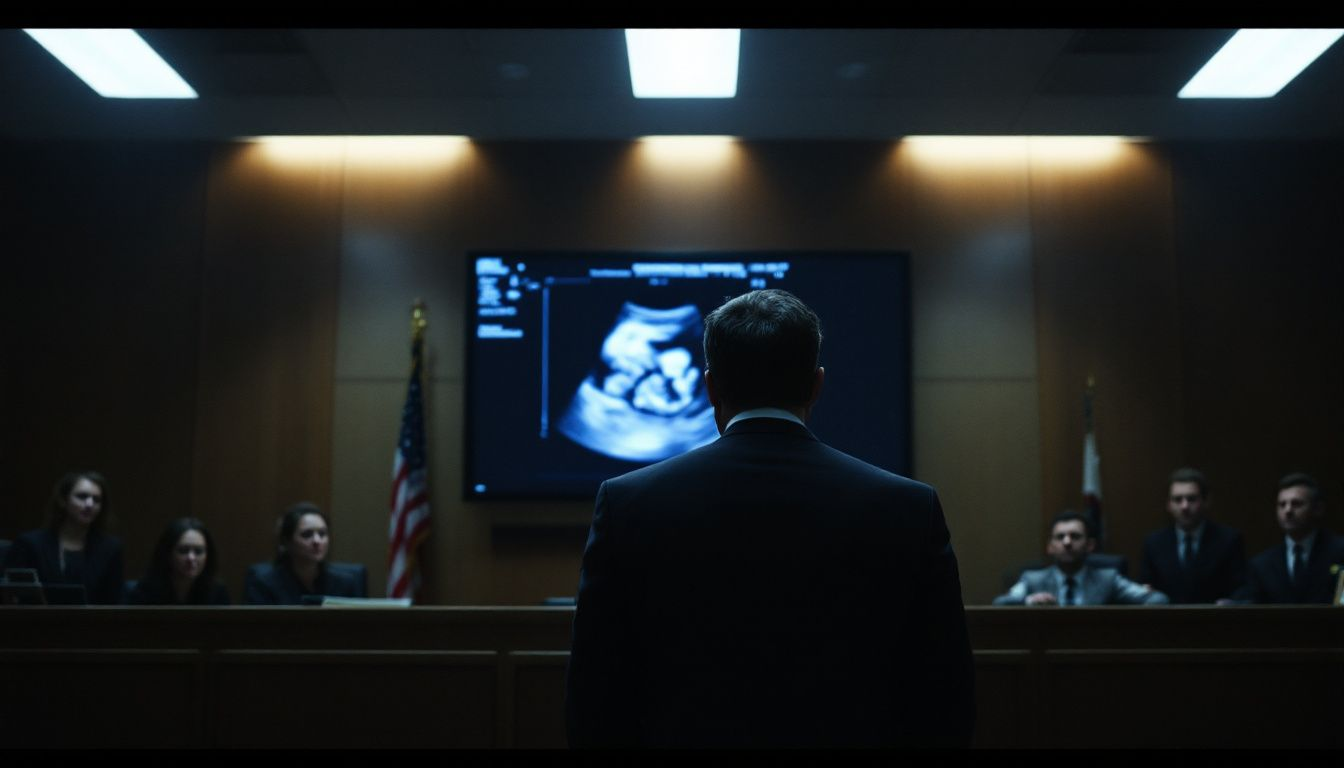Understanding Your Rights: How to File a Birth Defect Lawsuit
Wondering how to seek justice when a birth defect occurs due to medical negligence? A birth defect lawsuit can hold healthcare providers accountable and secure compensation for your child’s care. This article explores what a birth defect lawsuit involves, common causes, types of lawsuits, steps to file, and potential compensation.
Key Takeaways
- A birth defect lawsuit is a legal claim by parents seeking compensation for birth defects caused by medical negligence, which can include malpractice or failures in genetic testing.
- Common causes of birth defects include genetic disorders, environmental exposure to toxins, and medication-related negligence, emphasizing the need for preventive measures and awareness during pregnancy.
- Filing a lawsuit involves identifying the birth defect, gathering evidence, consulting a specialized attorney, and adhering to the statute of limitations, all crucial for a successful legal outcome.
What Is a Birth Defect Lawsuit?

A legal action initiated by parents to seek recompense for a child’s congenital disabilities due to medical carelessness is known as a birth defect lawsuit. In many cases, a child born with defects due to negligent actions during pregnancy or delivery can lead to significant emotional and financial burdens for the family. Congenital abnormalities might manifest immediately at the time of birth, either as visible irregularities, such as malformations in limbs, or unapparent ones that could affect various organs and systems internally. If subpar medical treatment results in an injury during birth, parents may file a birth injury lawsuit.
Should healthcare providers fail to meet established care standards resulting in the development of a congenital anomaly, it lays the foundation for filing a defect lawsuit. Medical negligence can take many forms—ranging from instances of improper practice to oversights during genetic testing or exposure risks from environmental toxins or chemicals—all warranting rightful compensation claims for ensuing medical expenses and other associated costs necessary for long-term specialized care needs.
To assist families impacted by these issues, enlisting an experienced attorney is crucial—they are instrumental not only in pinpointing negligent behavior but also in assembling corroborative evidence while consulting with field experts. A strong legal claim against healthcare practitioners who prescribed harmful medications amid their duty breach offers substantial backing required by families striving towards ensuring optimal caregiving provisions for their offspring.
Common Causes of Birth Defects

A variety of elements, encompassing both hereditary and environmental influences, can lead to birth defects. For example, chromosomal aberrations or mutations in a single gene—often more prevalent among closely related individuals—can cause genetic disorders. The likelihood of offspring being born with genetic abnormalities escalates with maternal age.
The presence of environmental pollutants and heavy metals is acknowledged as contributing factors for congenital disorders. When pregnant women come into contact with substances like pesticides or are exposed to toxic materials such as lead during pregnancy, it dramatically raises the chances that they will have children suffering from severe birth defects including brain damage and spina bifida. This underscores why steering clear of these harmful agents is critical for fetal safety.
The impact on birth defect development due to medicinal intake while expecting should not be underestimated either. Pharmaceuticals such as NSAIDs (Nonsteroidal Anti-inflammatory Drugs) and SSRIs (Selective Serotonin Reuptake Inhibitors) have been identified as increasing the probability of adverse outcomes when taken by expectant mothers. Prescription errors involving these drugs may result in avoidable congenital disorders. Hence alertness towards medication risks is crucial amongst those who are pregnant.
It’s often seen that multiple aspects—including genetics, lifestyle choices, and external conditions—all interplay when examining the etiology behind an infant’s congenital anomaly. Challenging prevention efforts include certain cases where causes remain elusive altogether—the mystery shrouding some birth defects persists despite our best understanding thus far—it remains pivotal for prospective parents to educate themselves about potential risks that might precipitate legal action if practitioner carelessness emerges later on down the line.
Types of Birth Defect Lawsuits
Lawsuits concerning birth defects are typically grouped according to the unique conditions and root causes of each incident. Birth injury lawsuits, on the other hand, arise from negligence during childbirth and often involve medical professionals or facilities. The principal categories encompass claims for medical malpractice and wrongful death. Lawsuits pertaining to medical malpractice occur in instances where healthcare professionals have not met the required standards of care, consequently resulting in a birth defect.
Conversely, when negligence leads to a fatal birth defect, wrongful death claims may be pursued, recognizing these distinctions is crucial for establishing which legal measures should be taken in pursuit of fairness and recompense.
Medical Malpractice
Birth defects can be caused by a variety of factors during pregnancy, including exposure to toxic substances, incorrect medication prescriptions, and substandard prenatal care. When medical professionals deviate from the recognized standard of care and this results in injuries or irreversible disabilities for a newborn, it is considered medical malpractice. Toxic chemical exposure or prescription mistakes made while pregnant are common causes of severe birth defects.
To make a valid medical malpractice claim regarding birth defects requires proving that healthcare providers failed to provide appropriate care which led directly to the defect. Evidence must show that under similar circumstances, a competent medical professional would not have made the same error. These claims necessitate detailed investigations and expert witness testimony in order to confirm responsibility.
Parents facing infant injuries due to negligent medical practices during gestation may hold those responsible accountable through legal action. Taking steps against these practitioners compensates affected families and also strives toward enhancing healthcare standards by ensuring such negligence does not recur. A skilled birth defect lawyer with experience in handling such cases is critical for guiding victims through this process effectively so they may obtain justice.
Genetic Testing Errors
Genetic testing errors refer to mistakes made during genetic testing, which can lead to incorrect or incomplete information about a child’s genetic makeup. These errors can have significant consequences for parents and children, including delayed diagnosis or inappropriate treatment. Examples of genetic testing errors include:
- False positives: Incorrectly identifying a genetic mutation or defect.
- False negatives: Failing to identify a genetic mutation or defect.
- Incomplete testing: Failing to test for all relevant genetic mutations or defects.
Exposure to Toxic Chemicals
Exposure to toxic chemicals during pregnancy can increase the risk of birth defects. These chemicals can be found in various products, including pesticides, heavy metals, and industrial chemicals. Examples of toxic chemicals that can cause birth defects include:
- Lead: A toxic metal that can affect cognitive and physical development.
- Mercury: A toxic metal that can affect brain development and function.
- Pesticides: Chemicals used to kill pests, which can affect fetal development and increase the risk of birth defects.
It’s essential for parents and medical professionals to be aware of the different types of birth defects and their causes. By understanding these factors, we can work together to prevent birth defects and provide the necessary care and support for affected children. If you suspect that your child’s birth defect was caused by medical malpractice or exposure to toxic chemicals, consult with an experienced birth defect lawyer to discuss your options and seek justice.
Wrongful Death
The death of a child due to birth defects arising from medical negligence can be classified as wrongful death. This might happen when healthcare professionals fail to adequately diagnose or treat conditions in the mother, or make mistakes during the delivery process. In such tragic circumstances, parents are entitled to initiate legal action for wrongful death in order to obtain both justice and financial reparation.
Remarkable settlements have shed light on the gravity of harm caused by medical malpractice related to childbirth. For example, one family was awarded $2.5 million after their infant died because of a physician’s neglect at the time of delivery. Similarly, another case resulted in receiving $3.5 million owing to an infant sustaining a hypoxic-ischemic brain injury attributable to substandard medical care—highlighting not just economic repercussions but also profound emotional devastation sustained by families.
Enduring the loss and accompanying hardship that comes with losing a newborn through negligent acts is immensely taxing emotionally and financially on any parent. By filing wrongful death claims against those responsible, aggrieved parents seek financial remedy for their suffering while simultaneously imposing accountability upon culpable parties which helps promote enhanced care standards within obstetrics thereby averting similar future heartaches.
Steps to File a Birth Defect Lawsuit

Initiating a lawsuit for a birth defect demands meticulous and prompt action, beginning with the recognition of the specific nature of the birth defect and pinpointing its possible origins. Following this identification, it is imperative to gather thorough documentation and evidence.
Engaging an adept lawyer who specializes in birth defects will greatly improve the prospects for a favorable verdict. It’s vital to act expeditiously so that you file within the applicable statute of limitations period, thereby maintaining your family’s entitlement to pursue just recompense.
Identify the Birth Defect and Its Cause
Recognizing a child’s birth defect accurately and determining its origin are essential for grasping the associated legal consequences and deciding on appropriate timelines to take action. Techniques such as blood tests, genetic testing, and imaging studies are commonly used to detect these defects. These approaches can effectively ascertain both the specifics of congenital disorders and guide necessary medical intervention alongside potential legal pursuits.
The risk of certain birth defects may be mitigated through preventative strategies like immunizations and maintaining proper nutrition during pregnancy. Those in lower socioeconomic positions face a heightened risk of giving birth to children with congenital disorders due primarily to inadequate healthcare access and poor nutrition availability. For litigation purposes, pinpointing why a defect has occurred is crucial in forging an impactful lawsuit.
Prompt exploration into available legal remedies upon suspicion about the cause behind a birth defect is advised due to stringent time frames set by law within which one must act—this is particularly important considering jurisdictions where there’s merely a 1-year statute of limitations on filing such claims. Rapid recognition coupled with swift action could considerably influence the outcome favorably when pursuing justice through a defect lawsuit related to childbirth anomalies.
Gather Evidence
Amassing thorough evidence is critical in prevailing in a birth defect lawsuit. Partnering with an adept birth injury lawyer specializing in birth injuries who has connections to a broad spectrum of medical specialists can significantly bolster your case. Accumulating all financial documentation such as medical bills, receipts, and proof of payments that pertain to the child’s health condition is essential. Ensuring every expense incurred is accounted for guarantees that any awarded compensation truly represents the family’s financial strain.
These professionals are pivotal as they lend credible insights into the medical intricacies involved, aiding in demonstrating both causation and liability.
Attorneys benefiting from access to internal medical experts find it advantageous when navigating complex health-related details associated with birth injuries.
Consult an Experienced Birth Defect Lawyer
Navigating the intricacies of demonstrating medical negligence in connection with a birth defect demands the expertise of an experienced birth defect lawyer. Such a lawyer is vital to ensure that all legal procedures are properly and promptly adhered to, thereby increasing the likelihood of a successful outcome.
Families seeking justice should reach out to a birth defect attorney for an initial consultation that’s both complimentary and confidential. It’s advised against attempting to pursue a birth defect lawsuit without professional legal representation due to the intricate nature of these proceedings.
The invaluable assistance offered by legal counsel ensures families receive proper guidance and support, preparing them adequately for any obstacles they may encounter throughout their case.
Contact 1-800-THE-LAW2 today for a free consultation with an attorney in our professional network.
Understanding Potential Compensation

Families affected by birth defects may seek monetary restitution for both tangible and intangible losses. Medical malpractice claims often involve personal and emotional complexities, particularly in cases of birth injuries and defects, highlighting the need for skilled legal representation. Tangible, or economic, losses encompass healthcare costs, continuous care needs, and lost wages from caring duties.
Intangible losses are central to birth defect lawsuits as well—especially with severe birth defects. These can involve compensation for pain and anguish suffered due to a potentially preventable birth defect that leads families down the path of legal recourse in pursuit of reparation and accountability.
Medical Expenses
Compensation for medical expenses can address the immediate financial demands such as hospital bills, medication costs, and requisite therapies for the child. These essential expenses often accumulate rapidly, imposing a substantial economic strain on households. Legal actions serve to mitigate these strains by securing coverage of all critical healthcare expenditures.
Legal claims may include compensation for extended treatment necessities like costly surgical interventions or perpetual care requirements. Adjustments that parents might have to implement in their homes to suit their child’s disability are also considered claimable expenses. Expenses associated with rehabilitation or therapy sessions, inclusive of special educational needs linked with learning difficulties due to the birth defect, can be part of this long-term cost allocation.
Parents may seek funds through lawsuits for required home modifications tied to accommodating a child’s unique disability within future necessities calculations. Such compensations are vital in guaranteeing that families are equipped financially to provide top-quality care for their offspring without succumbing to extreme monetary hardship.
Lost Income and Earning Capacity
If a child’s birth defect necessitates that their parents must forgo work to tend to their needs, these parents might be eligible for compensation corresponding to the income they’ve lost. This type of financial support is critical as it enables families who may have experienced reduced working hours or job cessation by one or both parents to offer around-the-clock care, maintaining economic security during such challenging times.
When determining compensation amounts in legal cases involving birth defects, considerable weight is placed on the potential earning capabilities of the afflicted child throughout their lifetime. Calculations consider how much a child’s capacity to earn an income later in life has been compromised due directly to limitations imposed by said birth defect.
It is essential for justice and thoroughness that any adjudication includes factors like parental loss of earnings and diminished future wage prospects faced by children with birth defects within its calculations. This ensures all-encompassing and equitable monetary awards are given out.
Pain and Suffering
Children afflicted with birth defects may endure lifelong disabilities, resulting in considerable emotional turmoil for both the child and their relatives. Such preventable birth defects can inflict extensive pain and suffering that transcend physical problems, severely diminishing life quality and mental health for the family unit as a whole. The purpose of compensation for these challenges is to mitigate the non-economic damages experienced.
Parents who face the devastating loss of a child due to a birth defect could be eligible to obtain reparation for sorrow, services needed, and support lost. The agony associated with wrongful death is beyond measure. Claims made under this category strive to offer some level of solace and monetary assistance amid such heartbreaking events. This form of compensation recognizes the depth of grief families undergo while helping them through their bereavement period and efforts toward recovery.
Choosing an Attorney

Selecting an appropriate attorney for a lawsuit involving a birth defect is imperative when seeking to hold responsible any careless medical practitioners. Medical malpractice lawsuits often arise from various medical errors, including prescription drug errors and birth injuries, highlighting the need for experienced legal representation. The impact of having an experienced birth defect lawyer on the success of your case cannot be overstated, as their expertise will greatly enhance the likelihood that families are awarded rightful compensation.
When searching for representation, prioritize finding lawyers who have demonstrated successful outcomes in cases concerning birth defects and who possess the necessary connections to medical authorities and assets required to confront negligent parties with authority.
To speak with an attorney today, contact 1-800-THE-LAW2 for a free legal consultation with an attorney in our network.
Experience and Track Record
Selecting a lawyer with expertise in birth defect litigation is essential for increasing your likelihood of triumph. Look into the history of success and related experiences that potential lawyers possess when considering them. An attorney who has a busy schedule, often filled due to referrals anda good reputation, signifies their adeptness at obtaining settlements for their clients.
A knowledgeable birth defect lawyer will guide you through the intricate legal steps involved in initiating a lawsuit, estimating possible damages, and conducting settlement discussions for you. Their specialized skills guarantee comprehensive evidence collection and adherence to proper legal procedures which boosts the chances of winning your case.
Resources and Medical Experts
Experts in the medical field play a critical role in shedding light on the intricate scientific and health-related details of a birth defect, aiding in pinpointing responsibility and establishing causation. Engaging recognized medical authorities can significantly amplify the validity of a lawsuit regarding birth defects, potentially yielding more favorable results for affected families. The expert evidence they deliver simplifies complicated health matters for legal decision-makers, thereby illuminating how much influence the birth defect has had.
Families may seek assistance from healthcare providers, hospital systems, and professional medical bodies to locate well-qualified experts who can provide an analytical review of complex health documents, offer insights into particular case aspects, and help gear up for court proceedings—lending credible weight behind their assertions.
Strategically incorporating testimony from knowledgeable experts about medical conditions during litigation augments its foundation by delivering persuasive explanations regarding both origins and consequences related to the congenital disability.
Filing Within the Statute of Limitations
The time frame for initiating a birth defect lawsuit varies from one state to another, with periods ranging between 1 and 4 years. The purpose of the statute of limitations is to guarantee that proof can be preserved and made available when required by legal processes. Often, in various areas, the period allotted to file a claim begins not at the moment of birth but upon recognizing the defect.
In some states, provisions exist that extend this deadline if a birth injury isn’t immediately noticeable. Under these circumstances, where an injury comes to light only after some time has elapsed since its occurrence, the countdown on this limitation begins from that point of discovery. It typically continues until such time as any minors involved reach adulthood.
Securing professional legal counsel is essential in understanding and complying with these intricate rules and critical timelines so families do not forfeit their right to seek justice through litigation.
Pursuing Justice and Preventing Future Negligence
It’s not only about securing financial restitution but also ensuring that those responsible for a birth injury are held to account. Insurance entities frequently try to reduce the amount they pay out, thus complicating the process for families in pursuit of justice. The compensation sought can cover both tangible and intangible losses including economic expenses and pain and suffering, aiming at improving the family’s quality of life.
In selecting legal representation for filing a birth injury lawsuit, it is beneficial to examine client feedback and testimonials which reveal an attorney’s track record and effectiveness. By taking legal action against medical negligence with such lawsuits, it may deter similar events from occurring by keeping healthcare providers vigilant regarding their duties.
When families engage in these types of legal actions following a birth-related incident, they do more than claim compensation. They contribute toward enhancing safety measures within the healthcare sector. Evaluating an attorney based on their history with verdicts and settlements allows one to assess how well-equipped they are to obtain favorable outcomes for clients affected by birth injuries. This twofold purpose—attaining just compensation while enforcing responsibility—is central when considering filing any form of legal action after experiencing such trauma.
Summary
It is imperative to grasp your entitlements and the intricacies involved when initiating a lawsuit for a birth defect to achieve redress and safeguard your child’s well-being. Every step, from pinpointing the origins of birth defects to mastering legal protocol nuances, is fundamental in obtaining both reparation and responsibility that your loved ones are owed. Securing an adept attorney, compiling extensive proof, and adhering promptly to the statute of limitations are all critical elements leading to triumphant legal action.
Engaging in such legal endeavors not only aids families in acquiring financial compensation but also fosters preventative measures against negligence and encourages enhanced care standards within healthcare practice. This path demands resilience and backing. With appropriate advice at hand, securing justice as well as improving prospects for your child’s future can indeed be realized.
Frequently Asked Questions
What is a birth defect lawsuit?
A birth defect lawsuit is a legal claim filed by parents seeking compensation for a child’s birth defect that resulted from medical negligence, environmental factors, or medication errors.
These lawsuits aim to hold responsible parties accountable for their actions.
Types of Birth Defects
Birth defects can be categorized into several types, each with its unique characteristics and causes. Understanding the different types of birth defects is crucial for parents and medical professionals to provide the necessary care and support for affected children.
Physical Defects
Physical birth defects refer to structural abnormalities that affect a child’s physical appearance or function. These defects can range from mild to severe and may require surgical intervention or ongoing medical care. Examples of physical birth defects include:
- Heart defects: Abnormalities in the heart’s structure or function, such as holes in the heart or abnormal blood flow.
- Cleft palate: A split in the roof of the mouth or lip, which can affect speech, eating, and breathing.
- Clubfoot: A deformity of the foot or ankle, which can cause difficulty walking or mobility issues.
- Spina bifida: A condition where the spine and spinal cord don’t properly form, leading to nerve damage and mobility issues.
Developmental Defects
Developmental birth defects refer to abnormalities in a child’s development, which can affect their cognitive, emotional, or behavioral functioning. These defects can be caused by genetic or environmental factors and may require ongoing therapy and support. Examples of developmental birth defects include:
- Autism spectrum disorder: A neurological disorder that affects communication, social interaction, and behavior.
- Down syndrome: A genetic disorder that affects cognitive and physical development.
- Cerebral palsy: A group of disorders that affect movement, muscle tone, and coordination.
Genetic Defects
Genetic birth defects refer to abnormalities in a child’s genetic code, which can affect their physical or developmental functioning. These defects can be inherited from parents or caused by genetic mutations during fetal development. Examples of genetic birth defects include:
- Sickle cell anemia: A genetic disorder that affects the production of hemoglobin, leading to anemia and other health issues.
- Cystic fibrosis: A genetic disorder that affects the respiratory and digestive systems.
- Muscular dystrophy: A group of genetic disorders that affect muscle strength and function.
What are common causes of birth defects?
Common causes of birth defects are genetic disorders, environmental pollutants, certain medications, and medical negligence during pregnancy. Understanding these risks is crucial for minimizing their impact on fetal development.
How do I file a birth defect lawsuit?
To file a birth defect lawsuit, you must identify the defect and its cause, gather evidence, and consult with an experienced birth defect lawyer.
It’s essential to act swiftly to comply with the statute of limitations.
What compensation can I receive from a birth defect lawsuit?
You can receive compensation for medical expenses, lost income, and pain and suffering due to the birth defect. This compensation is designed to alleviate both the economic and emotional hardships faced by your family.
Why is choosing an experienced attorney important?
Experienced lawyers are crucial for successfully handling the intricacies of a lawsuit related to a birth defect. A lawyer with experience in this field can gather the required evidence and discuss settlement terms to secure just compensation.
The decision of which attorney to engage has a substantial bearing on both the resolution of your case and your entire experience throughout legal proceedings.




